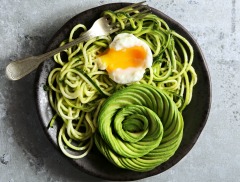Don't just meal plan... meal plan intelligently - with Meal Genius! Sign up for our free newsletter to get delicious recipes, sample meal plans and a whole lot more!
Watermelon
Watermelon is a native of Africa and a member of the Cucurbitaceae family, which also includes cantaloupe, squash and pumpkin.
Because of its usefulness as a source of potable liquid, watermelon made its way into Asia and the Mediterranean as caravans traveled north.
Watermelon is a great thirst quencer, and provides an excellent source of vitamin C and a good source of beta carotene. Like other red foods, it also contains the powerful antioxidant lycopene.
Antioxidant Score (ORAC)=142
The Benefits
- Special diets: Autoimmune Paleo Diet, Elimination Diet, Gluten-Free Diet, Gluten-Free/Dairy-Free Diet, Grain-Free Diet, Low Acid Diet, Low Histamine Diet, Low Oxalate Diet, Low Starch Diet, Paleo Diet (Light), Paleo Diet (Strict), Pescetarian Diet, Primal Diet, Vegetarian Diet, Whole Food
- Excellent Source of:
- Good Source of:
- Preferences: No Fish, No Red Meat, No Pork, No Eggs, No Shellfish, No Gluten, No Nuts, No Seeds, No Soy, No Dairy, No Poultry, No Molds, No Coconut, No Pseudograins, No Citrus, No Corn, No Yeast, No Peanuts, No Nightshade, No Legumes, No Grains, Low Carbohydrate, Low Cholesterol, Low Fat, Low Sodium, Low Sugars, Low Saturated Fat
Related Foods
Related Nutrients
Selecting and Storing
Look for symmetrical watermelons without any flat sides. To determine is a watermelon is ripe, slap the side. If it resounds with a hollow thump, it`s a good indicator that it`s ready to eat.









